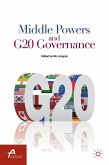The status quo of the modern world order, a diplomatic entente best characterized as "connivance diplomacy," is limited in its performances, defensive of its privileges, midway between competition and cooperation. It is examined here through its history, its functions, and its failures.
"Building on the experience of the Concert of the Powers, Bertrand Badie develops the concept of 'connivance.' It is partway between armistice and peace, conflict and cooperation, and bridges realist emphasis on power and the liberal and constructivist focus on norms and rules. Badie makes a strong case for its utility in an increasingly multipolar world composed of powerful units with different cultures and values but which nevertheless need to live with one another in peace."
- Richard Ned Lebow, professor of International Political Theory, Department of War Studies, King's College, London
"Bertrand Badie's account of exclusive multilateralism is an effective antidote against too much enthusiasm for the many small groupings, formal like the Security Council and less formal like the G8, which are populating today's international relations. His critique of the West's usurpation of the leadership role in these clubs not only enhances misgivings of former victims of colonialism and imperialism. Even if one believes that cooperation among great powers to prevent major war is not a bad thing, Badie's call for inclusion serves as a necessary counterweight against too much devotion toward the powers that be."
- Harald Mueller, professor of International Relations, Goethe University and executive director, Peace Research Institute Frankfurt
"While I have more confidence than Bertrand Badie in institutional constraints and in Great Powers' tendency to reciprocally block each other's hegemonial ambitions out of self-interest, I profoundly share his concern with their ability to conclude bargains detrimental to less powerful participants in the state system. This is clearly one of the best books on the dilemmas of Great Power cooperation that I have read in many years."
- Matthias Schulz, professor of History of International Relations and Transnational History, University of Geneva
- Richard Ned Lebow, professor of International Political Theory, Department of War Studies, King's College, London
"Bertrand Badie's account of exclusive multilateralism is an effective antidote against too much enthusiasm for the many small groupings, formal like the Security Council and less formal like the G8, which are populating today's international relations. His critique of the West's usurpation of the leadership role in these clubs not only enhances misgivings of former victims of colonialism and imperialism. Even if one believes that cooperation among great powers to prevent major war is not a bad thing, Badie's call for inclusion serves as a necessary counterweight against too much devotion toward the powers that be."
- Harald Mueller, professor of International Relations, Goethe University and executive director, Peace Research Institute Frankfurt
"While I have more confidence than Bertrand Badie in institutional constraints and in Great Powers' tendency to reciprocally block each other's hegemonial ambitions out of self-interest, I profoundly share his concern with their ability to conclude bargains detrimental to less powerful participants in the state system. This is clearly one of the best books on the dilemmas of Great Power cooperation that I have read in many years."
- Matthias Schulz, professor of History of International Relations and Transnational History, University of Geneva








